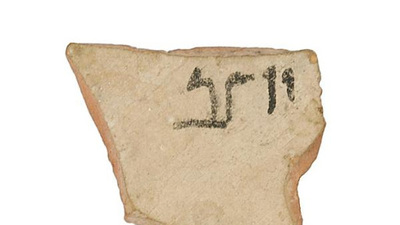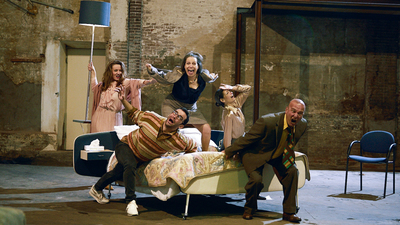Dear Friends, In May, 2017, Yael Valier, a student and contributor to the David Cardozo Think Tank, launched a remarkable play about the famous Disputation of Barcelona between the legendary Jewish scholar Nachmanides, also called Ramban (1194-1270) and a Jewish convert to Christianity, named Pablo Christiani, concerning the truth of Judaism and Christianity. This debate was held over a period of 4 days in Barcelona in front of King James I of Aragon in 1263.
This is by far the most famous disputation between Judaism and Christianity ever to take place. Nachmanides was victorious and was even rewarded by King James I but was ultimately forced by the Dominicans to leave Aragon (Spain). He subsequently settled in Israel. Nachmanides recorded, from memory, the full dispute.
In our days, Roy Doliner, art detective and author of the best-seller The Sistine Secrets with Benjamin Blech, wrote a play about the disputation called Divine Right.
Yael Valier, who had just launched Theater and Theology, her theater company in Jerusalem, produced this play in May 2017. The production became a huge success and was staged many times. More information about it can be found here.
Since the David Cardozo Academy and Theater and Theology sometimes collaborate and have many similar goals, I participated in a discussion about this production when it was staged for the first time at the historic Khan Theater. This was a great honor.
In 2020, Yael published a paper on her experience and insight concerning this play which was published by Emanuel University of Oradea’s theological journal Perichoresis in September.
No doubt this became a most important essay which reflects in many ways the David Cardozo Academy’s ideology and goals and also touches on my “Contemplative Autobiography”. We are therefore very thankful to Yael for allowing us to reproduce her essay in three parts. This is the last part.
For part 1 see here.
Part 2 can be found here.
Nathan Lopes Cardozo
Dramaturgical and theological issues involved in producing and staging a play in Jerusalem about the disputation of Barcelona
Continued…
Theological Issues
Before they even buy a ticket, Jewish audiences are highly invested in the outcome of any play featuring controversy between Christians and Jews. For Jewish audiences, this is not just an interesting play about a past event. In the Jewish psyche, medieval disputation is simply another event in a continuous line of trials, persecutions, expulsions, missionizing, book-burnings, and pogroms. Jewish practice keeps ancient events fresh. As mentioned above, the Passover Seder recalls the Exodus from Egypt with great drama and ceremony, keeping this seminal event very much alive in the Jewish consciousness. The order of the Seder includes a passage that explains the Jewish position on persecution: ‘And this is [the divine promise] that maintained us and our fathers, for not only one [persecutor] stood against us to annihilate us, but rather in every generation they stand against us to annihilate us, and the Holy One, blessed be He, preserves us from their hands’ (Traditional Passover Haggada, my free translation). This passage of the divine promise, written about 1,600 years ago and set to new music, became an Israeli hit song in 2009, when the Israeli psyche was still reeling from the violence of the Second Intifada, and in particular from the horrendous terrorist attack on a high school in 2008. In Israel, the ancient and the modern are inseparable.
At fixed times every year, Jews say the Merciful Father prayer for people who were killed in the Holocaust, in pogroms, and during the Crusades. They also recite laments on certain fast days for these events and for the destruction of the First and Second Temples. In other words, for Jews, the past is part of a continuous present. Furthermore, Jewish prayer, ancient and modern, relates to space in the same way that it relates to time. There is no difference to traditional Jews between Diaspora Jews and Israeli Jews, and they plead for both. Jews are Jews, undifferentiated by country of residence.
All of this is to say that the fact that the Disputation of Barcelona occurred close to 800 years ago, in Spain, does not cushion modern Israeli audiences from its tension and menace. In his 2009 doctoral dissertation, Milan Zonka discusses this phenomenon. He claims that Yitzhak Baer’s evaluation of the Disputation and its primary texts stem ‘from Baer’s antagonistic notion of medieval Jewish-Christian relations and his ‘lachrymose’ view of Jewish history, in which every interreligious confrontation represents another battle in the historical war for Jewish survival, [rather] than from a reasoned evaluation of the event itself’ (Zonka 2009: 20). Zonka may be right, but Baer’s conception is a good description of that of my educated, religiously-involved Jerusalem audiences too.
So, due to their religious consciousness and training, my audiences need to see a play that ultimately shows a Jewish triumph, but due to their scholarship and sophistication, they also need to see a play that arrives at that triumph via a balanced and nuanced approach.
Jewish law includes injunctions that make staging a play about the Disputation difficult, both for Orthodox Jewish actors and for Orthodox Jewish audiences. Although there are always different interpretations of the law, a fundamental Jewish distaste for anything that could smack of idolatry remains. Jewish law debates whether Christian belief constitutes idol worship or not. There are opinions on both sides, relating to the Jewish difficulty in relating to the belief in a triune God. Rabbi Moses ben Maimon (Maimonides), born in Cordoba in the 12th century, takes a conservative position, considering Christianity equal to idolatry based on his perception that Christians believe in a God who is not One. In his major compendium of Jewish law, Maimonides writes, ‘It is forbidden to enter a church or an idolatrous temple’ (Maimonides 1990: AZ:1). The 13th-century Rabbi Menachem haMeiri from Catalonia takes a counter position in his work Beit Ha-Behirah. In the section of his commentary on the Talmudic tractate Avodah Zarah, he argues that the majority of the laws against idolatry and against fraternizing with idol worshippers do not apply to Christians because Christians are ‘restricted by the ways of religion’, and their religion is one that urges them to use their free will and to live meritoriously (Meiri 1969: 53). Many Modern Orthodox Jews hold a liberal position vis-à-vis Christianity, but the Maimonidean position continues to pervade the Jewish consciousness as well.
Though volumes have been written on this topic, I will restrict myself to three laws quoted by three different Jewish scholars as further examples of scholarship dealing with the Jewish relation to Christianity: Rabbi Yosef Karo, author of the Shulchan Aruch, the seminal Code of Jewish Law written from the Sephardic perspective and published in 1565 in Venice writes, ‘There is no prohibition against owning idolatrous figures. However, there is a prohibition against gazing at such figures, which would in general prevent one from owning them. It is permitted to gaze at an idolatrous figure that is not intended for the purpose of worship’ (Karo 1977: YD 141:1).
Also in the 16th century, Rabbi Moses Isserles added a gloss to the Shulchan Aruch, based on the Ashkenazic tradition. He includes a comment on the law above, claiming that a cross constitutes an idolatrous figure, but in circumstances in which worship is not intended, such as a pendant on a necklace, it is permitted (Isserles 1977: YD 141:1-3).
Rabbi Shlomo Ganzfried from Hungary published the Kitzur Shulchan Aruch in 1874. It is a summary of the Shulchan Aruch but it also refers to later commentators. He writes, ‘It is forbidden to utter the name of an idol, whether for some purpose – such as to tell a friend, “Wait for me next to such-and-such idol” – or whether it is for no reason at all, as per Exodus 23:13, “Do not mention the name of other gods”’ (Ganzfried 1991: 167:12).
All of these laws are based on previous scholarship, which itself is based on an understanding of biblical text. Regardless of whether all members of modern Israeli Jewish audiences subscribe to these laws or are even aware of them in particular, history, Jewish law, and the milieu in which it was forged have created a society with a strong visceral reaction to Christian icons and modes of worship. Furthermore, where Christian audiences react in one way to, say, a portrait of Jesus on the Cross, Jewish audiences react differently. To Christian audiences, a portrait of Jesus is a portrait of Love. A portrait of Jesus inspires notions of mercy, grace, forgiveness, and compassion. To many traditional Jews, depictions of Jesus or a crucifix evoke cultural memories and a latent fear of persecution, blood-libel, oppression, and death. Divine Right makes reference to this phenomenon in Act II, Scene 1, in a dramatic night-time scene in which one of the sons of Nahmanides engages in a heated argument with the king’s justiciary in the deserted courtroom:
GERSHON: Ahhh, there’s something you know about, isn’t it? Killing, thieving, spreading hate – that’s all right, isn’t it, as long as you can trot back to your church and bow down to a statue or (pointing to a crucifix) that symbol of Roman torture and say you did it all in the name of your savior!
Many of the English-speaking actors in and around Jerusalem are Orthodox Jews. Those that are not are often learned in Jewish practice and culture. Four of the thirteen actors in my cast have rabbinic ordination! Some of my actors, steeped in consciousness of the laws, injunctions, and debates quoted above, refused to wear a cross as part of their costume, though one was willing to consider wearing a Franciscan Tau. Some of my actors refused to shave off their beards. Some of my actors refused to kneel or to make the sign of the cross, as it is so strongly ingrained in them that these actions are forbidden. Whether doing so for the sake of a stage play could be permitted, as some of the legal opinions I quote above imply, is irrelevant; it feels forbidden. Some of my actors were not willing to intone the Pater Noster. All of this, even though it is clear that these actions in no way represent the true feelings of the actors. (One of the actors asked me to add a blurb in the playbill making it explicit that the opinions he espouses on stage do not represent his true opinions.) I was expecting this and, in the interests of getting the best actors I could as well as in deference to my own tradition (I am an Orthodox Jew), I told all my auditionees that I would work around their objections. As a result, I staged the play so that only one actor kneels, though that actor does not make the sign of the cross, and only one actor crosses himself (though he refused to kneel!). Some of my actors asked to change some references to ‘Jesus Christ’ in the play to simply ‘Jesus’. They objected in deference to the opinion, quoted above, that it is forbidden to mention the name of other gods, and in acknowledgement that ‘Christ’ means ‘anointed’—therefore implying that Jesus was indeed the Messiah. It should be noted that some of my actors expressed no objection whatsoever to any of the above issues.
Some potential audience members, too, expressed a reluctance to buy tickets for a play whose set includes large Christian icons. The publicity posters for Divine Right, which included a photo of Pablo Christiani wearing a cross, were taken down in some conservative Orthodox neighborhoods. As a result, two other poster versions were printed. One simply left out the crosses, and one, printed for a special performance in an Orthodox neighborhood community center outside of Jerusalem, included the following blurb: ‘The set includes large Christian icons. The Ramban and the Jews of Barcelona were surrounded by these, and the discomfort they create in us is a reflection of the discomfort they suffered.’ This blurb was a compromise I negotiated with the director of the community center, who refused to promote the play without it.
It should be emphasized that there are plenty of communities and theater groups in Israel—the overwhelming majority – where none of this would be a problem. The goal of Theater and Theology, though, is to bring thought-provoking theological material to scholarly audiences who seek education along with their entertainment. This particular niche draws religiously and culturally aware audiences, particularly in Jerusalem, where Theater and Theology is based.
The difficulties I faced in producing Divine Right are not exclusive to me or to Theater and Theology. Other Orthodox playwrights and producers who are interested in creating educational, theologically relevant theater face the same issues. Two modern English-speaking Israeli playwrights, Sharon Katz and Avital Macales, recently wrote Hidden, a musical about a family of conversos in Spain in the 1700s. Hidden was produced by the
Women’s Performance Community (WPC), an Orthodox theater company comprising female-only casts who perform for female-only audiences for reasons of modesty. Katz and Macales made far more conservative decisions than I did, based on the sensitivities of their Orthodox/Ultra-Orthodox audiences. While trying to project a picture of the Christian community that is not a caricature, but deliberately not as nuanced as Doliner’s, they decided to avoid all representations of crosses, icons, and statues, in deference to the laws and mores I quote above. Katz and Macales invented the prayers in their play, in consonance with a strict understanding of the Jewish prohibition against intoning the prayers of another religion and of mentioning the name of foreign gods, whereby none of the prayers in their show make mention of the Son or the Holy Spirit. They felt they had to write the content of the prayers to be consistent with what any Jew would feel comfortable saying. Though Katz and Macales had actors costumed as friars, the prayers the actors chanted only involved sounds, like ‘aaah’, and the occasional neutral word, such as ‘Hallelujah’. According to Macales, whom I interviewed while she and Katz were still writing the musical, ‘If we put actual words to a tune and have people dressed as monks singing, the visual will be too strong. We need to avoid giving the impression that the people on stage are actually chanting a Christian prayer. The audience would not appreciate the realism. They’d be uncomfortable. The only way they can allow themselves to see this show is by knowing that they won’t encounter any strongly religious Christian portrayals. They would never go to see a show on this topic written by a secular playwright. I have had to invent ‘Christian’ prayers for small children to say. I came up with something like, ‘I thank Thee for the day that you have given me, and I plead with You to deliver me from sin’. [The focus on sin seems solidly Christian to me, and it still answers the requirement of being authentically Jewish too.) Orthodox child actors are going to say these lines. What are their parents going to say? Mom, can you help me with my lines? I’m very nervous about this’ (Macales 2017, personal interview).]
Beyond the difficulties I faced in convincing some of my actors to act overtly Christian on an overtly Christian set, and the difficulties I faced in convincing my target audience to attend such an event, even though my target audience is not as conservative as Macales and Katz’s, I also faced difficulties in training my Jewish actors to understand the philosophies that would shock and offend devout medieval Christians. In order for Jewish audiences to understand the volley of proofs and insinuations during the debate, and to understand the sensitivities, courage, and danger involved, they must comprehend the implications of the interlocutors’ pronouncements. Divine Right is actually a much more balanced play than Jews or Christians tend to realize; since committed Jews and Christians recognize and resonate with their own arguments and positions, and tend to unconsciously dismiss the opposing position as irrelevant, they remain immune to arguments that pose a genuine challenge to their respective orthodoxies.
A good example of the above phenomenon is a speech by Pablo Christiani to Father Tomas in Act I, Scene 2 of Divine Right in which he tries to explain the wicked stubbornness of the Jews:
[They are] So smug, so all-knowing… you look at them and their lives and call it faith? That’s not faith—it’s dull habit, like that of an unthinking pack animal plowing the same row, year after year. They can only look down, their shoulders are so bent under the yoke they wear, the heavy yoke of their Law. But will they shrug it off, even for a moment of freedom? Never! No, they cling desperately to their familiar burden, they refuse to look up even for an instant; they refuse to see the new Light shining down on them from Heaven.
The above is a legitimate criticism of Judaism that should not be dismissed without consideration, but it tends not to resonate with Jewish audiences, who might dismiss it rather than be inspired to consider its implications. The same is true of Christian audience members who may unconsciously dismiss powerful Jewish arguments before examining them in any way.
Hence, it is critical that the actors playing Christians inform the mostly Jewish audience, through their expressions and reactions, of what would have been outrageous and offensive to the Christians in King James’ court, and to convincingly render the power of reasonable Christian arguments by showing the discomfort on the face of the Jewish onlookers who hear them. The audience needs these cues to keep it aware of and focused on the various heresies on both sides – the problem is that it is difficult for actors to react to heresy if they do not recognize it!
For example, in Doliner’s play, as in the report of Nahmanides himself, Nahmanides tells the king in Act 1, Scene 2, ‘My lord, you are worth more to me than the Messiah. You are a Gentile king and he is a Jewish one, but the Messiah in our religion in only a king of flesh and blood like you. I do not live my life in hope of his salvation. What is important to me, as it is to any Jew, is what I do here and now to earn it myself.’ Of course, this was a shocking statement for the Christian onlookers who attended the Disputation, but to my Jewish actors, it is entirely in keeping with their philosophy, and therefore something to which they would tend to react with a slight nod. In this case and in many others, I had to work with my actors to ensure that they reacted to the pronouncement with the appropriate level of shock and disgust. This work involved reading the play slowly through and discussing the implications of each round of challenge-and-response for the Christian side and the Jewish one. My actors did not have any trouble understanding the Christian point of view once it was taught to them, but they did have trouble staying in character when acting as observers to the proceedings. They needed constant reminding that they were portraying observers steeped in Christian philosophy. Had my actors been religiously indifferent, it would have been easier for them to stay in character, but for these religiously and culturally aware Jewish actors, it was hard to shake the habit of listening like a Jew.
Doliner includes an epilogue in Divine Right in which the actors fill in for the audience the fates of the various characters after the events described. Similarly to the prologue, the epilogue has actors tell the story while no longer in character. For dramatic effect, and in order to help audiences who may have felt uncomfortable seeing Jews wearing a different religion’s symbols, I have the actors de-role as they speak their lines during the epilogue. This device culminates in the actor playing Pablo Christiani taking off his zucchetto and cross pendant as he says his lines. Taking off these religious symbols makes the Jewish and Christian characters look more similar – a fitting prelude to the last line of the epilogue, spoken by Nahmanides: ‘And God, what happened to God? Oh, the Supreme Judge still sits on the Heavenly Throne. And as God watches us dispute His Name through the ages, He sheds a tear and says: “How long, O Man? How long?”’
Acknowledgments
I am grateful to Roy Doliner, playwright of Divine Right, and Avital Macales, co-playwright of Hidden, for agreeing to be interviewed for this paper. I am also grateful to Dr. Hannah Davidson, medievalist and author of the article ‘HaRamban Veha’aggada Beheksher Vikuah Bartzelona’ (Nahmanides and Aggadah in the Context of the Disputation of Barcelona), for her advice throughout the production of Divine Right and for her help in locating sources for this paper.
Bibliography
Anouilh J (1972) L’alouette. Paris: La Table Ronde.
Ball W (1984) A Sense of Direction: Some Observations on the Art of Directing. New York: Drama Book Publishers.
Caputo N and Clarke L (2016), Debating Truth. The Barcelona Disputation of 1263, A Graphic History. Oxford: Oxford University Press.
Dramaturgical and Theological Issues Involved in Producing and Staging a Play, 61 PERICHORESIS 18.4 (2020)
Cohen J (1982) The Friars and the Jews: The Evolution of Medieval Anti-Judaism. Ithaca-London: Cornell University Press.
Doliner R (1985) Divine Right. Unpublished. Copyright registered in Library of Congress.
Ganzfried S (1991) Kitzur Shulchan Aruch. In Kitzur Shulchon Oruch. Jerusalem: Moznaim Publishing Corporation.
Isserles M (1977) Hagaot HaRama. In Shulhan Aruch. Jerusalem: TalMan.
Karo J (1977) Shulhan Aruch. Jerusalem: TalMan.
Maccoby H (1982) Judaism on Trial: Jewish-Christian Disputations in the Middle Ages. London: Associated University Press.
Maccoby H (2001) The Disputation. London: Calder Publications Ltd.
Maimonides M (1990) Mishna Torah. Jerusalem: Moznaim.
Meiri M (1969) Beit HaBehira. Jerusalem: Isaak Lang.
Zonka M (2009) Authority and Apostasy: The Barcelona Disputation in the Context of Thirteenth-Century Jewish-Christian Polemics. PhD Thesis, Karlova v Praze
This newsletter was made possible with the support of the Louis and Dina van de Kamp Foundation, August 2020.






